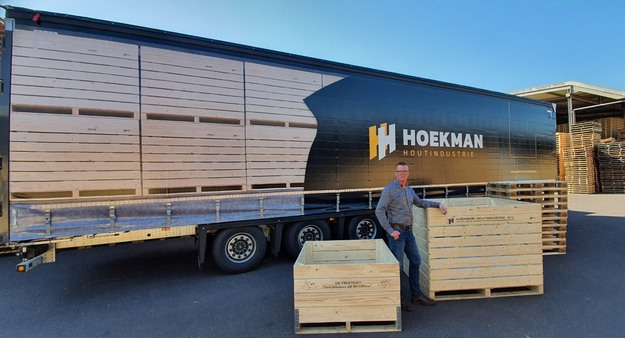Plastic crate providers regularly describe their products as sustainable alternatives to wooden storage crates in the media. "That is completely unjustified," says Robert Helder of Hoekman Houtindustrie in the Netherlands. "Over the last 40 years, wooden crates have proved themselves to be sustainable. Plastic boxes still have to do so. Wood is a natural product. So, other natural products fare very well in these."

Robert is also surprised that wood is considered unclean. "Plastic is not more hygienic than wood. That was already demonstrated in 2008. Tests were done on wooden and plastic crates. The Federal Biological Research Center for Agriculture and Forestry and the Institute for Foodstuffs Technology conducted these. These are both in Germany. They tested 15,000 pallets. Half as much bacteria was found on the wooden pallets compared to plastic ones."
"For a long time, it was thought wood's porous structure encourages germs. But, this study refuted that. This porous structure allows the wood to absorb moisture. So, bacteria cannot survive on the surface. Especially pine, but other woods too, kill the germs," explains Robert.
"Wooden crates, made from untreated wood, can be entirely recycled. Even at the end of its life cycle, it can be used as firewood or mulch. The wood packaging industry can make these products even more hygienic. That can be done by using the correct wood and treatment."
"In practice, new pallets and boxes are only used in particularly sensitive conditions. These must be dried to contain only 20% residual moisture. These planks, boards, and blocks are then sanded down. That ensures that, for instance, sawdust, does not cling to the pallets and crates. They can, therefore, be easily cleaned," he says.
"I find the claim that wood is unhygienic amusing. Look at the many top chefs who slice vegetables on wooden boards in their cooking shows. Just like wooden boards, wooden pallets and fruit and vegetable storage crates can be universally used. Even in extraordinarily hygienic places. These include the food production, fruit, agricultural, and pharmaceutical industries," says Robert. "Wooden pallets and crates are excellent to recycle too. Sustainable wood is also guaranteed. This is thanks to PEFC or FSC certification."
"Wooden boxes are extremely durable. Wood does not wear, tear or decay much. Using 30-year-old crates for fruit and potato storage is nothing unusual. We have been supplying repair materials, in case of damage, for years. It is easy to repair such a crate yourself. This benefits its lifespan. A plastic crate is not (easily) repaired. These boxes mostly need to be replaced."
"Wooden crates also have practical advantages for growers. For example, these crates are highly flexible when it comes to size. Most fruit farmers work with 1,14 x 1,14m crates. But there are many different sizes. We can transport many crates at a time in our LHV. We can nestle the 1 x 1,20m crates. So, we can fit as many as 156 in a normal truck. And 252 in an LHV," Robert concludes.
For more information:
Robert Helder
Hoekman Houtindustrie BV
19 Spinner Street
7461 TV, Rijssen, NL
Mob. : +31 (0) 618 998 257
Tel. : +31 (0) 548 515 771
Email: verkoop@hoekmanhoutindustrie.com
Website: www.hoekmanhoutindustrie.nl
